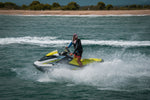
Personal Watercraft: Exploring the Thrills and Responsibilities of PWC Ownership
, by Safe Water Team, 3 min reading time

, by Safe Water Team, 3 min reading time
Personal watercraft (PWC), often referred to by brand names such as Jet Skis, WaveRunners, or Sea-Doos, have become synonymous with adventure and excitement on the water. These compact, agile vessels offer riders an exhilarating experience as they skim across the surface of lakes, rivers, and oceans. In this article, we'll explore the features, benefits, and responsibilities of owning and operating a personal watercraft.
A personal watercraft is a small, motorized vessel designed to carry one to three passengers in a sitting or kneeling position. Propelled by a jet of water expelled from the rear of the craft, PWCs are known for their maneuverability, speed, and agility on the water. They are typically used for recreational purposes such as cruising, watersports, and exploring, although they may also serve practical purposes such as rescue operations or law enforcement.
Compact Size: PWCs are compact and lightweight, making them easy to transport, launch, and maneuver compared to larger boats. Their small size also allows them to access shallow or restricted waterways where larger vessels cannot go.
Agile Handling: With their jet propulsion system and responsive steering controls, PWCs offer agile handling and precise maneuverability on the water. Riders can perform sharp turns, spins, and jumps with ease, making them ideal for watersports such as wakeboarding, waterskiing, and freestyle riding.
Speed and Performance: Personal watercraft are designed for speed and performance, capable of reaching speeds of up to 60 miles per hour or more, depending on the model and engine size. Their powerful engines and lightweight construction deliver thrilling acceleration and adrenaline-pumping rides for riders of all skill levels.
Versatility: PWCs are versatile vessels that can be used for a variety of recreational activities, including cruising, fishing, exploring, and towing watersports equipment. They offer a wide range of options and accessories, such as storage compartments, towing hooks, and boarding ladders, to enhance the boating experience and accommodate different interests and preferences.
While personal watercraft offer plenty of thrills and excitement, owning and operating one also comes with responsibilities:
Safety: Safety should always be a top priority when operating a personal watercraft. Riders should wear appropriate safety gear, including life jackets, wetsuits, and protective eyewear, and adhere to boating regulations and navigational rules. They should also maintain a safe distance from other vessels, swimmers, and obstacles to avoid accidents or collisions.
Environmental Stewardship: PWC owners should be mindful of their impact on the environment and take steps to minimize pollution and protect natural habitats. This includes properly disposing of waste and trash, avoiding sensitive or protected areas, and observing wildlife from a respectful distance.
Respect for Others: Personal watercraft can be noisy and disruptive to other boaters, swimmers, and waterfront residents. PWC owners should be considerate of others and avoid excessive noise, speed, or reckless behavior that may disturb or endanger others on the water.
Proper Maintenance: Like any watercraft, personal watercraft require regular maintenance and care to ensure safe and reliable operation. Owners should follow manufacturer recommendations for maintenance intervals, inspections, and repairs to keep their PWC in optimal condition and prevent breakdowns or accidents.
Personal watercraft offer a unique and thrilling way to experience the water, combining speed, agility, and excitement in a compact and versatile package. Whether you're cruising along the coastline, towing watersports enthusiasts, or exploring hidden coves and inlets, PWCs provide endless opportunities for adventure and fun on the water. By embracing the responsibilities of ownership, practicing safe boating habits, and respecting the environment and others, PWC enthusiasts can enjoy the thrill of the ride while promoting a culture of safety, stewardship, and respect on the waterways.